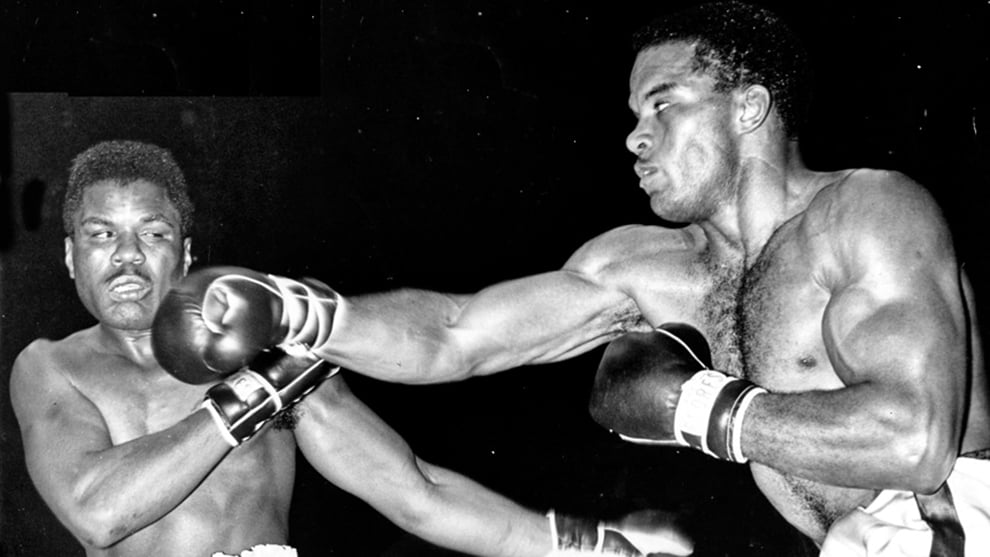Name: Eddie Machen
Born: 18 July 1932
Died: 8 August 1972 at the age of 40
Career: 1955 to 1967
Record: 64 fights, 50 wins (29 by KO/TKO), 11 losses (3 by KO/TKO), 3 draws
Division: Heavyweight
Stance: Orthodox
Titles: Pacific North West champion
Major Contests
Scored wins over: Howard King, Nino Valdes (twice), Johnny Summerlin, Joey Maxim **(twice), Bob Baker, Tommy Jackson*, Willi Besmanoff, Pat McMurty, Alex Miteff, Alonzo Johnson (twice), Wayne Bethea, Mike DeJohn (twice), Brian London *, Doug Jones*, Roger Rischer, Jerry Quarry *
Lost to: Ingemar Johansson**, Zora Folley*, Sonny Liston **, Harold Johnson **, Floyd Patterson**, Ernie Terrell **, Karl Mildenberger *, Manuel Ramos*, Joe Frazier**, Henry Clark, Boone Kirkman
Drew with: Zora Folley, Cleveland Williams*
**Past/ future holder of a version of a world title
* Unsuccessful challenger for a version of a world title
Eddie Machen’s Story
Machen was the fourth-born of six boys. He played basketball and football in High School, and he and his younger brother Paul (Paul boxed extensively as an amateur and had a short professional career but was later arrested and imprisoned for second-degree murder) both tried boxing.
Machen’s uncle, Dave Mills, had boxed as a professional. He started in the USA and lost to Sam Langford for the “World coloured heavyweight title”. Mills also spent some time based in Chile, and he was 1-2 in three fights against Luis Firpo.
Mills started to train and guide Machen but they had a falling out and Machen decided to put his future in other hands. It all proved wasted as after just three amateur fights in 1952 Machen was convicted of armed robbery and spent three years in prison.
On his release, Machen took up boxing again and had his first professional fight in March 1955. He was 11-0 in his first year with 10 wins inside the distance, six of them in the first round, and he was already fighting ten-round bouts. That rapid rise continued in 1956 with eight more wins, including a points victory and then a stoppage of world-rated Nino Valdes, landing Machen a world rating after just 13 months as a professional.
In 1957, he twice outpointed former light-heavyweight champion Joey Maxim and decisioned leading heavyweight Bob Baker. In November, he stopped Tommy Jackson, who just four months earlier had lost to Floyd Patterson in a challenge for the heavyweight title.
The logical next step for Machen, by now No 1, was to get a shot at the title. Patterson’s manager Cus D’Amato controlled the title and instead of giving Machen a shot he had Patterson defend, just one month after the Jackson fight, against Pete Rademacher who had won an Olympic gold medal at the 1956 Games but had never had a professional fight.
Patterson won, but there was still no sign that D’Amato would let Machen fight for the title. Undeterred Machen showed he was not risk averse by facing the world No 2 Zora Foley in April 1958. Machen was 24-0 at the time and Foley had won his last 18 fights. The fight ended as a split draw so Machen remained No 1.
D’Amato now matched Patterson against Texan Roy Harris, again leaving Machen in the cold. Machen took a huge risk by agreeing to face hard punching Swede Ingemar Johansson in Sweden. Johansson 20-0 had cleaned up the European opposition knocking out Henry Cooper and stopping Joe Erskine, so Machen took the precaution of having a return clause in the contract.

In September 1956, in front of a record crowd for a boxing event in Sweden, Johansson floored Machen three times in the first round for a kayo victory. Next, D’Amato had Patterson defend against Brian London in May 1959, even though London had lost his last fight against Henry Cooper.
With the London fight out of the way, D’Amato began to arrange for Patterson vs. Johannson. Machen went to court spending $16,000 of his own money over the return clause in his contract with Johansson and the court ruled in Machen’s favour but the ruling was ignored and Johansson stopped Patterson in three rounds to win the title.
To keep himself in the picture, Machen then put together a run of seven wins but lost a unanimous decision to Foley in January 1960. Machen had gained a reputation as a cautious fighter, but he never dodged anyone, and in September, he took on Sonny Liston, the most feared boxer on the planet at that time.
Liston had won his last 23 fights with Mike DeJohn, Cleveland Williams, Nino Valdes, Roy Harris and Zora Foley all disposed of inside the distance. Machen taunted Liston throughout the fight but lost on points over twelve rounds. He picked up the pieces and went back to facing tough opposition beating Mike DeJohn twice, Brian London, Doug Jones, Roger Rischer and Alonzo Johnson.
He also drew with Cleveland Williams and lost only to light-heavyweight champion Harold Johnson. Machen finally did get a fight with Floyd Patterson in July 1964, but by then Patterson was no longer champion. The fight was held in Sweden and in front of 40,000 Swedish fans, Machen lost on points.
His only shot at a version of the title came in March 1965 when he was outpointed by Ernie Terrell in a fight for the vacant WBA belt. Machen continued to face quality opposition, losing to Karl Mildenberger and Manuel Ramos but winning over unbeaten Jerry Quarry. The end was in sight for Machen’s career and he retired in May 1967 after losses to Joe Frazier, Henry Clark and Boone Kirkman.
There had been worrying things going on outside the ring during Machen’s career. Although the No 1 rated contender he had to moonlight as a bouncer to make ends meet and his financial problems had him suffering from depression. He hd shown erratic behaviour and in 1963 a Highway patrolman came upon Machen sitting in his car.
He had written a suicide note to his wife and had a gun on the passenger’s seat. He was sent to a mental hospital and became violent, with as many as seven staff required to control him. He was dosed with tranquilisers but after another violent incident was put in a straitjacket and eventually given electric shock treatment before being released.
After his release at the end of 1963, he resumed his career. He filed for bankruptcy in 1967, listing debts of $66,000 and assets of only $13,000. In a replay of his previous mental problems he was again found parked in a vehicle in the same area as the original incident and with a gun but instead of being taken to hospital he was charged with possessing a firearm and fined and released.
In 1968 he was arrested after a barroom brawl and later for driving whilst drunk. He threatened to kill the officer who stopped him and assaulted the officers who arrested him. His wife had divorced him and taken his two children with her.
He was working as a longshoreman when a policeman found Machen’s body in the car park of the apartments where he lived and it was decided he had either fallen or jumped from his window on the third floor of the building.
